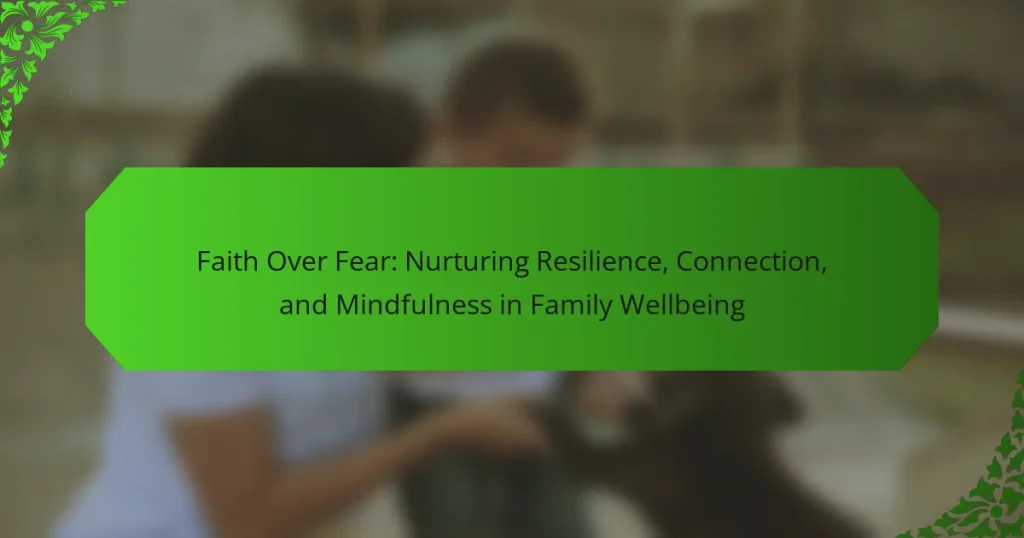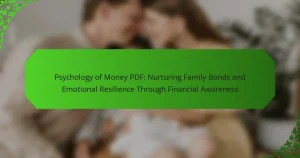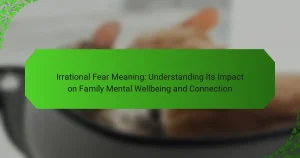Nurturing resilience, connection, and mindfulness is essential for family wellbeing. Faith strengthens family bonds and provides a coping mechanism during challenges. Connection fosters emotional support and reduces stress. Mindfulness enhances communication and deepens interactions, empowering families to navigate adversity effectively.
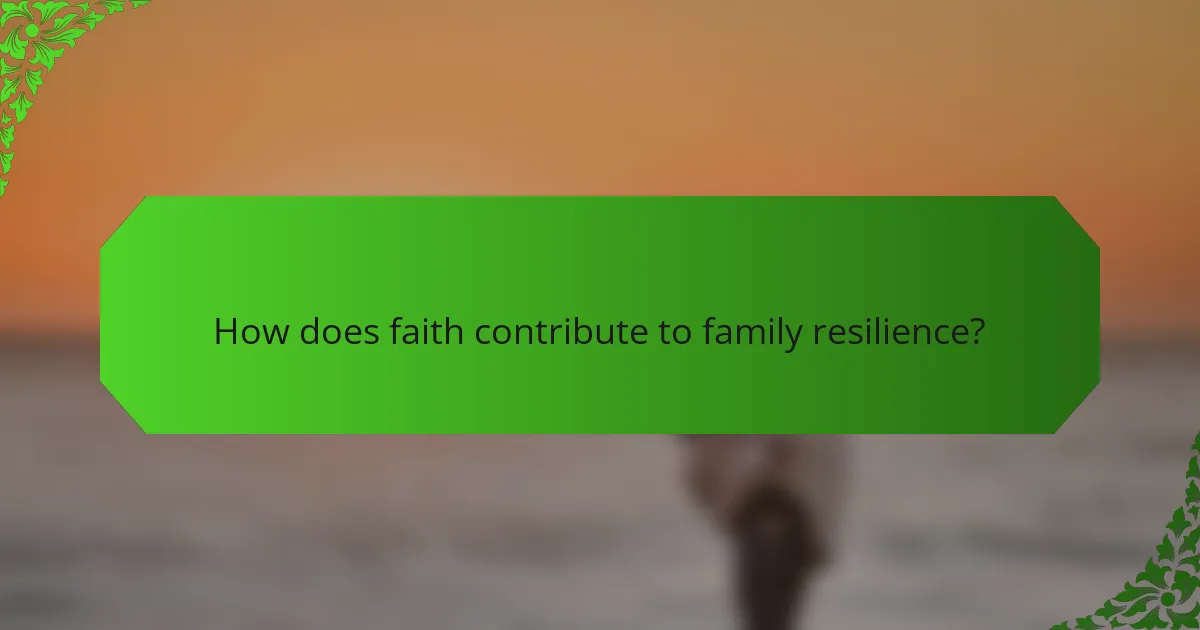
How does faith contribute to family resilience?
Faith strengthens family resilience by fostering connection, promoting mindfulness, and encouraging a supportive environment. It provides families with shared values and beliefs that enhance unity during challenges. Faith can serve as a coping mechanism, offering hope and a sense of purpose. Research indicates that families who engage in spiritual practices report higher levels of emotional support and better communication. This collective strength helps families navigate adversity, reinforcing their bonds and overall wellbeing.
What are the psychological benefits of faith in family dynamics?
Faith fosters resilience, connection, and mindfulness in family dynamics by providing emotional support and a shared purpose. It enhances communication, reduces stress, and promotes a sense of belonging. Families with strong faith often report higher levels of trust and cooperation. Research indicates that faith can lead to improved mental health outcomes, such as lower anxiety and depression rates. Additionally, families that engage in faith-based practices tend to exhibit greater emotional stability and conflict resolution skills.
How can families cultivate a faith-based support system?
Families can cultivate a faith-based support system through intentional practices and shared values. Establish regular family gatherings for prayer, discussion, and reflection. Encourage open communication about faith experiences and challenges. Engage in community service together to strengthen bonds and deepen faith. Create a family mission statement that aligns with core beliefs. Include mindfulness practices, such as meditation or gratitude exercises, to enhance resilience and connection. These actions foster a supportive environment that nurtures spiritual growth and family wellbeing.
What practices enhance collective faith within families?
Practices that enhance collective faith within families include open communication, shared rituals, and mutual support. Engaging in regular family discussions about beliefs fosters understanding and connection. Establishing traditions, such as prayer or gratitude practices, strengthens bonds and reinforces shared values. Encouraging each family member to express their thoughts and feelings cultivates an environment of trust and resilience.
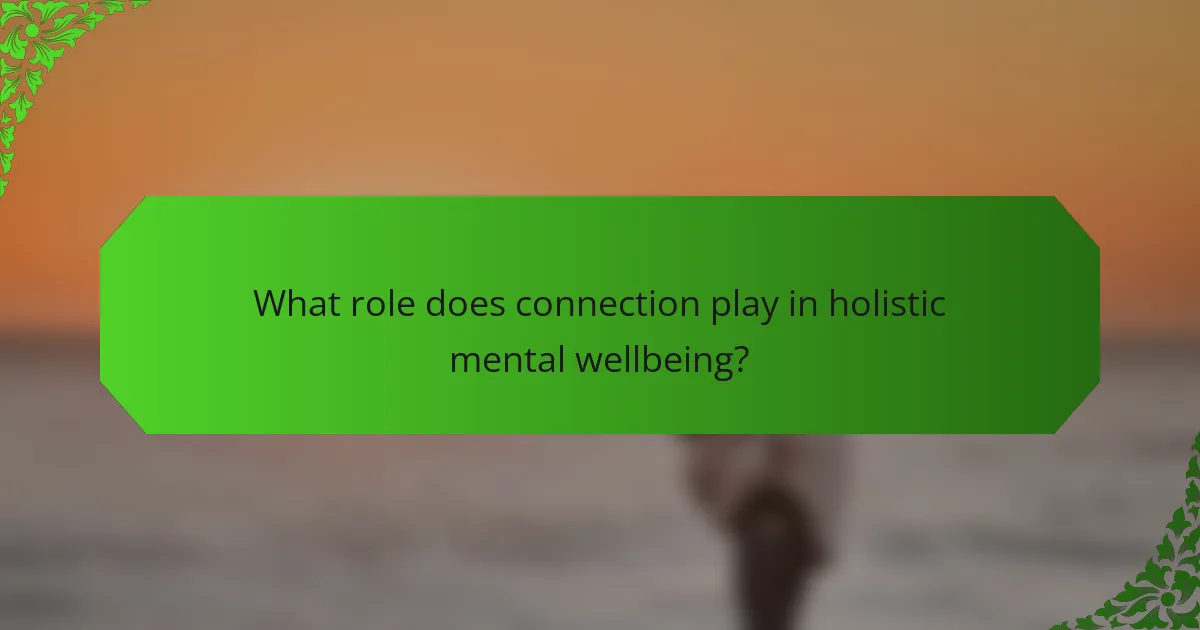
What role does connection play in holistic mental wellbeing?
Connection is essential for holistic mental wellbeing, fostering resilience and mindfulness. It strengthens family bonds, enhances emotional support, and promotes shared experiences. Studies show that strong connections reduce stress and improve overall mental health. Engaging in meaningful relationships cultivates a sense of belonging, which is vital for individual and collective wellbeing.
How can families strengthen their emotional bonds?
Families can strengthen their emotional bonds through intentional practices that foster connection and resilience. Engaging in regular family activities, such as shared meals and open discussions, enhances communication. Mindfulness practices, like family meditation or gratitude exercises, promote a positive atmosphere. Establishing family rituals creates a sense of belonging and stability. Prioritising emotional support during challenges nurtures trust and understanding among family members. These strategies collectively enhance family wellbeing and reinforce emotional ties.
What activities promote deeper connections among family members?
Engaging in activities that promote deeper connections among family members includes open communication, shared meals, and collaborative projects. These practices foster resilience and mindfulness, enhancing family wellbeing. For example, regular family dinners encourage dialogue, while working together on a garden cultivates teamwork and shared goals.
What are common barriers to family connection?
Common barriers to family connection include poor communication, differing values, and time constraints. These obstacles can hinder relationships and emotional intimacy. Addressing these issues requires intentional effort to foster understanding and shared experiences. For example, regular family meetings can enhance communication and alignment on values. Prioritising quality time together strengthens bonds and builds resilience.
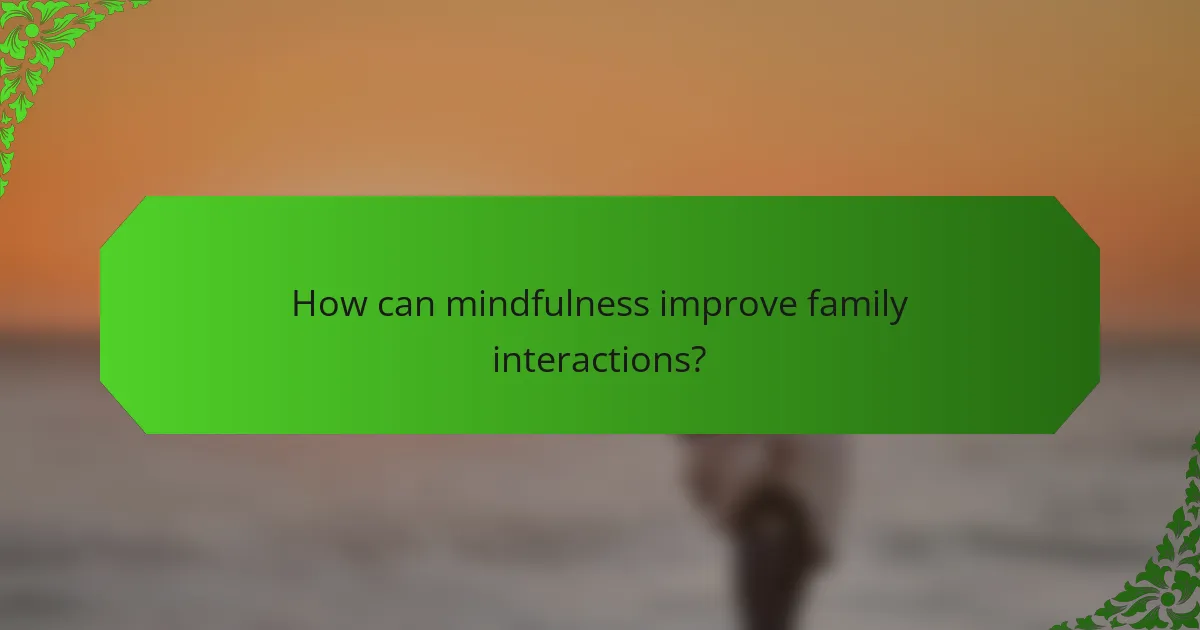
How can mindfulness improve family interactions?
Mindfulness enhances family interactions by fostering emotional awareness and improving communication. Practicing mindfulness cultivates patience, reduces stress, and encourages active listening. This leads to deeper connections among family members. Research indicates that families who engage in mindfulness activities experience increased resilience and harmony. Implementing mindfulness techniques can transform family dynamics, creating a supportive environment for growth and understanding.
What mindfulness techniques are effective for families?
Mindfulness techniques effective for families include deep breathing exercises, guided imagery, and family meditation sessions. These practices enhance emotional connection and resilience. Research shows that regular mindfulness can reduce stress and improve communication among family members. Incorporating mindfulness into daily routines fosters a supportive environment, promoting overall family wellbeing.
How can families incorporate mindfulness into daily routines?
Families can incorporate mindfulness into daily routines by setting aside time for shared practices. Begin with simple activities like mindful breathing or gratitude journaling. Establish a daily ritual, such as a family walk, to encourage connection and awareness. Use mealtime to engage in discussions about feelings and experiences, fostering open communication. Integrate mindfulness into chores by focusing on the sensations involved in the tasks. Encourage reflection at the end of each day to reinforce lessons learned and celebrate achievements. These practices nurture resilience and strengthen family bonds.
What are the long-term benefits of practicing mindfulness as a family?
Practicing mindfulness as a family fosters long-term benefits such as enhanced emotional resilience, improved communication, and stronger connections. Families that engage in mindfulness together experience reduced stress levels, leading to a more harmonious home environment. Research indicates that mindfulness can improve emotional regulation, allowing family members to respond more compassionately to one another. Additionally, shared mindfulness practices create a sense of unity, promoting a supportive atmosphere where each member feels valued and understood. Over time, these practices contribute to overall family wellbeing and stability.
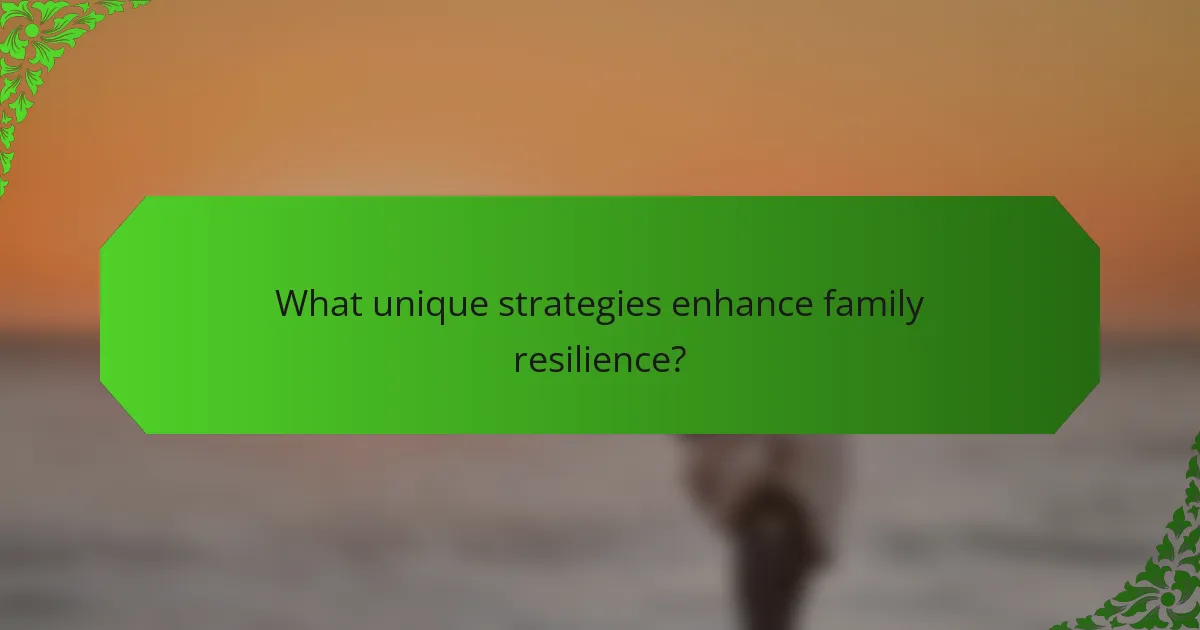
What unique strategies enhance family resilience?
Faith-based practices, open communication, and shared experiences uniquely enhance family resilience. These strategies foster connection and mindfulness, creating a supportive environment. Engaging in regular family rituals strengthens bonds, while practicing gratitude promotes a positive outlook. Mindfulness activities, such as meditation or yoga, cultivate emotional awareness and reduce stress. Together, these approaches empower families to navigate challenges effectively.
How can storytelling foster resilience in families?
Storytelling fosters resilience in families by creating shared experiences that strengthen emotional bonds. It allows family members to process challenges together, enhancing their coping skills. Through narratives, families can explore fears and uncertainties in a safe environment, promoting mindfulness and connection. This practice nurtures a supportive atmosphere, where resilience is built collectively, empowering each member to face adversity with faith over fear.
What role does vulnerability play in building family strength?
Vulnerability is essential for building family strength as it fosters trust and connection. When family members share their fears and struggles, they create an environment of openness. This openness encourages resilience, allowing families to face challenges together. Additionally, vulnerability promotes mindfulness by encouraging members to be present with each other’s emotions. As a result, families that embrace vulnerability often experience deeper connections and enhanced wellbeing.
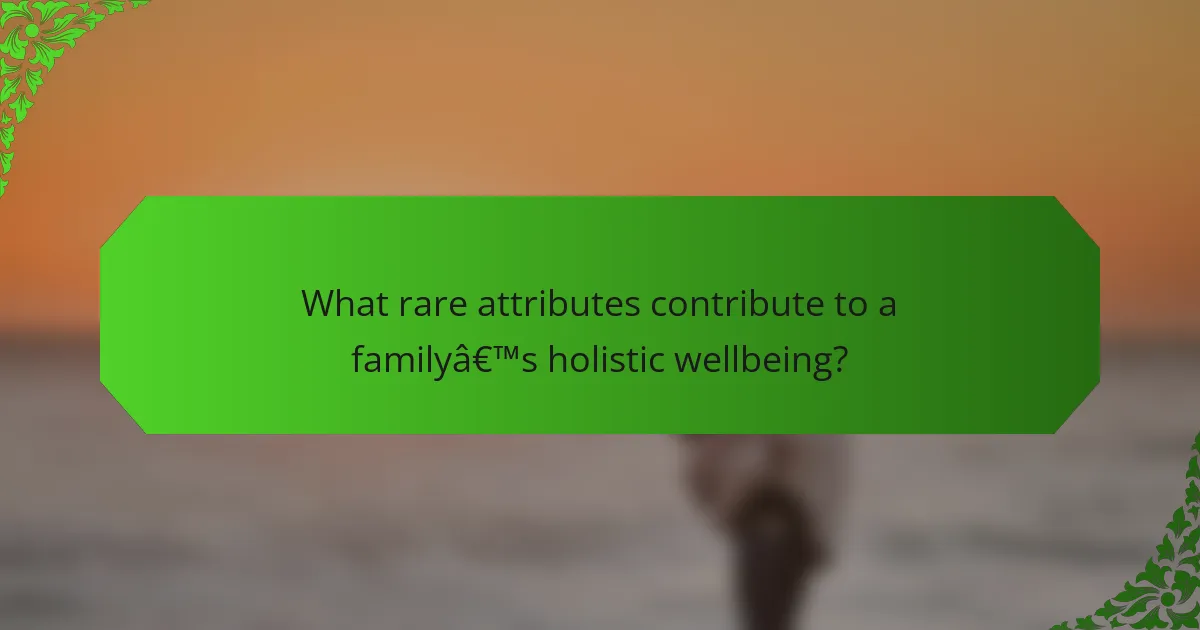
What rare attributes contribute to a family’s holistic wellbeing?
Faith, connection, and resilience enhance family wellbeing through unique attributes like shared rituals, open communication, and collective mindfulness practices. These elements foster deeper emotional bonds and promote a supportive environment. Families that engage in regular reflections on their values report increased resilience and a stronger sense of belonging. Furthermore, mindfulness activities practiced together can lead to improved mental health outcomes, creating a holistic approach to wellbeing.
How can families embrace diversity in their wellbeing practices?
Families can embrace diversity in their wellbeing practices by fostering open communication and inclusivity. Encouraging each family member to share their unique perspectives promotes resilience and connection. Integrating mindfulness techniques that reflect diverse cultural backgrounds enhances overall wellbeing. Practicing gratitude and empathy as core values nurtures a supportive environment where all voices are valued.
What uncommon rituals can families adopt for mental health?
Families can adopt uncommon rituals like gratitude circles, nature immersion, and storytelling nights to enhance mental health. Gratitude circles involve sharing things each member is thankful for, fostering connection and positivity. Nature immersion promotes mindfulness and reduces stress through outdoor activities. Storytelling nights encourage creativity and bonding, allowing families to express emotions and experiences. These practices nurture resilience and strengthen family wellbeing.
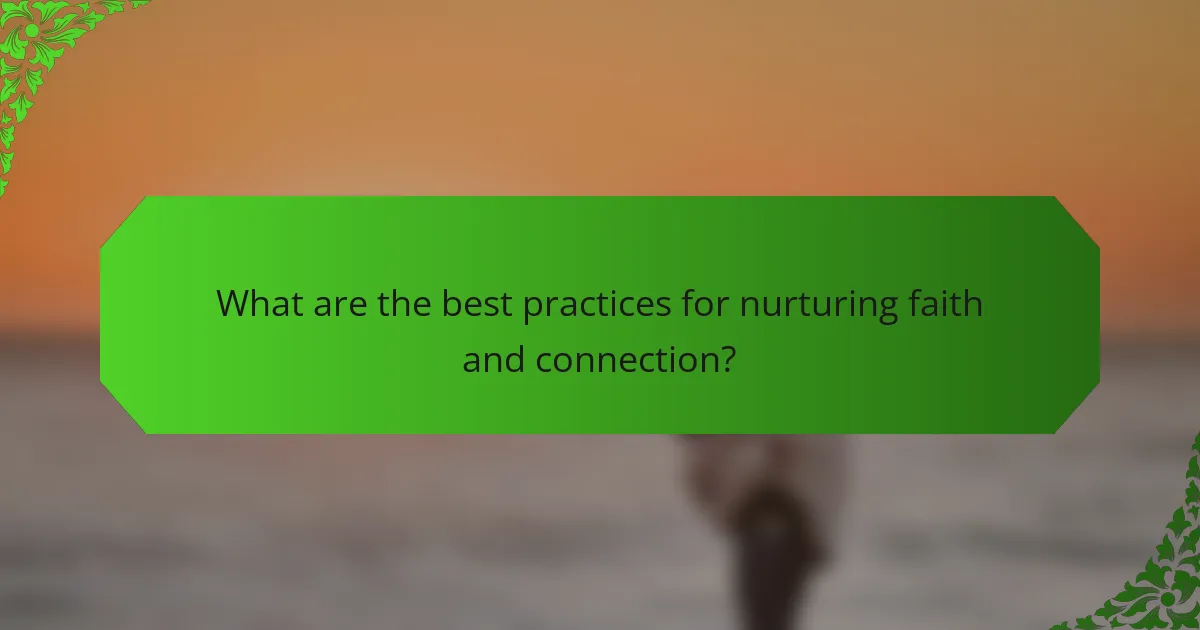
What are the best practices for nurturing faith and connection?
To nurture faith and connection, prioritise open communication, shared experiences, and mindfulness practices. Encourage family discussions about beliefs and values to strengthen relationships. Engage in activities that promote teamwork, such as volunteering or family projects, fostering a sense of unity. Incorporate mindfulness techniques like meditation or gratitude exercises to enhance emotional resilience and awareness. Establishing regular family rituals can also deepen connections, creating a supportive environment that nurtures faith and resilience.
How can families avoid common pitfalls in their wellbeing journey?
Families can avoid common pitfalls in their wellbeing journey by prioritising open communication, setting realistic expectations, and practicing mindfulness together. These strategies foster resilience and connection.
Open communication helps families express feelings and concerns, reducing misunderstandings. Setting realistic expectations prevents disappointment and encourages a positive outlook. Practicing mindfulness, such as meditation or shared activities, enhances emotional awareness and strengthens family bonds.
By integrating these practices, families can navigate challenges effectively, ensuring a supportive environment for each member’s wellbeing.
What expert insights can guide families in their holistic approach?
Expert insights for families emphasize fostering resilience through open communication, shared experiences, and mindfulness practices. Engaging in activities that promote connection, such as family meetings or collaborative projects, nurtures a supportive environment. Incorporating regular mindfulness exercises, like meditation or nature walks, enhances emotional well-being. Additionally, instilling a mindset of faith over fear encourages families to face challenges together, reinforcing their bond. Research shows that families practicing these strategies report higher levels of satisfaction and emotional stability.
How can families create a sustainable wellbeing plan together?
Families can create a sustainable wellbeing plan together by prioritising resilience, connection, and mindfulness. Start by setting shared goals that reflect family values, fostering open communication to address individual needs. Incorporate regular family meetings to discuss progress and challenges, ensuring everyone feels heard. Engage in mindfulness practices collectively, such as meditation or nature walks, to strengthen bonds and promote emotional health. Encourage resilience by celebrating achievements and learning from setbacks, creating a supportive environment for growth.
